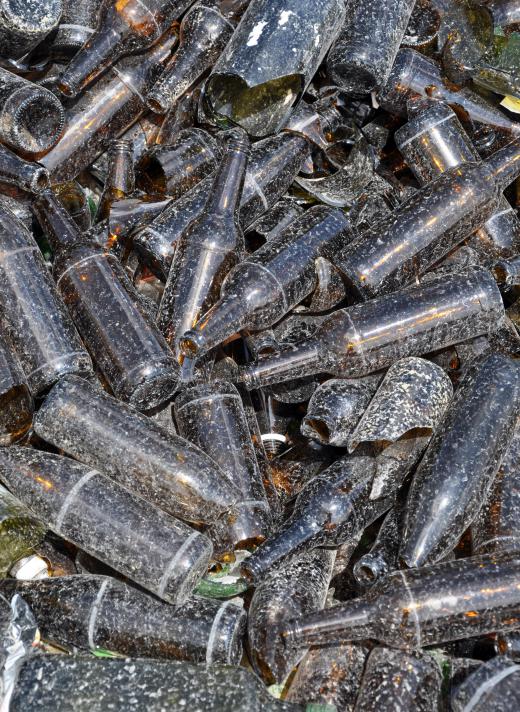What is Dross?
 Mary McMahon
Mary McMahon
The term "dross" is used to describe waste material which must be removed and processed separately or discarded in a safe place. It may also be dangerous, poisonous, or impure, depending on the context of the usage. This word from from an Old German word meaning "dregs," and it was originally used in reference to manufacturing processes.
In the original sense, people used "dross" to refer to impurities which arise during the smelting process. As metal is melted, it oxidizes, forming a layer of scum and impurities which float to the surface as the metal heats up. This dross can be skimmed from the metal so that the refined product will be more pure, ensuring a reliable performance when it is cast or worked. With some metals, the amount of dross generated can be very high, as much as 50% of the metal, and this can drive the cost of the metal up significantly.

In addition to containing the products of oxidation, the dross can contain a variety of unwanted impurities which have gotten into the metal. In some cases, these impurities can be dangerous in addition to unwanted, explaining the occasional usage of the word to describe something which is potentially toxic. This type of dross needs to be handled and processed with special care so that it does not pose a risk to human health, and it can sometimes cause problems in refineries and forges, as it may offgas dangerously when heated.

Over time, people came to use the term more generally to refer to impurities. For example, a city might say that it processes its water to remove dross before delivering it to the end consumer, meaning that it is filtered to pull out potentially dangerous impurities. People may also the term when describing other waste materials which emerge during other types of refining processes.

People can also talk about dross metaphorically. For example, someone might say "I was able to get more work done once I cleared my mind of mental dross." In this case, it is not a physical impurity which can be skimmed away, but a collection of unwanted and distracting thoughts which someone manages to clear so that he or she can focus. The elimination of mental dross is a key goal of disciplines such as meditation and guided imagery, and people are sometimes encouraged to discard the mental form of waste materials so that they can focus their thoughts and efforts more effectively.
AS FEATURED ON:
AS FEATURED ON:













Discussion Comments
I agree, the term "dross" for me was not exactly something worthless -- we got it delivered from the coal man and paid for it!
He delivered bags of "coal" -- biggish chunks which were used in the fireplaces throughout the house, and "dross" were the largest bits, which were about walnut size. Both had coal dust on them. The "dross" was used in the kitchen "range" or oven, which stayed on day and night, heated the kitchen, heated a water tank and had two ovens for cooking in. That worked only on burnable waste and this famous "dross," until we went smokeless.
@lighth0se33 – That is pretty offensive. I'm sure I would fall into that man's category of social dross!
I've never used the word when referring to other people, but I do use it to refer to my worries and distractions. If I don't concentrate carefully on what I'm doing, then all sorts of fears and scenarios will creep into my head and trouble me.
Praying helps me wade through the dross. I find my center, and then I can focus on what I need to, in spite of the dross.
Water processing may remove some dross, but it doesn't usually get it all. You may not be able to see the impurities floating in your water, but that doesn't mean that they aren't there.
I have a water purifier attached to my faucet, and I use it to strain dross out of water before I drink it. If I'm going to be boiling the water for soup or veggies, I don't bother filtering it, because boiling will remove the dross, anyway. However, I never drink a glass of water that hasn't been filtered first.
My grandmother used to call the dirt and insects left behind after washing a basket of blackberries “dross.” She would dump the berries into a plastic container, and she would have to soak them several times to get all the junk off of them.
Blackberries usually attract ants, small spiders, and tiny flying insects. So, if you put them in a bucket of water and let all of the stuff rise to the top, you will likely see lots of bugs.
So, to her, dross removal was simply soaking and rinsing the blackberries until the water appeared clean. I have never heard anyone else use the word dross in this way, but I always think of it when I wash berries.
I have heard some people who view themselves as superior to most using the word “dross” to refer to those they view as inferior. Their dross definition differs from the ones I have become accustomed to, and I find it very offensive.
There is this one wealthy man who comes into the restaurant where I work, and he usually has a wealthy guest with him. On more than one occasion, I have heard them refer to “the dross of society” and how it needs to be removed.
Since they think of themselves so highly, eliminating this dross would likely leave only a few people in the town. I'm so glad that they are not in positions of power.
My father is English originally, and he and others I have met from Great Britain tend to use the word "dross" as a more general colloquial for junk, waste, or trash. I am not sure how many people, even from the UK, could still define dross with its literal definition.
I recall in Scotland of the 40's/50's the word "dross" was very popular and represented basically the coal dust and debris that accumulated. It came cheaper than the coal, and was used to form a "crust" over the normal coal, making it burn more slowly but throw off just as much heat.
Post your comments